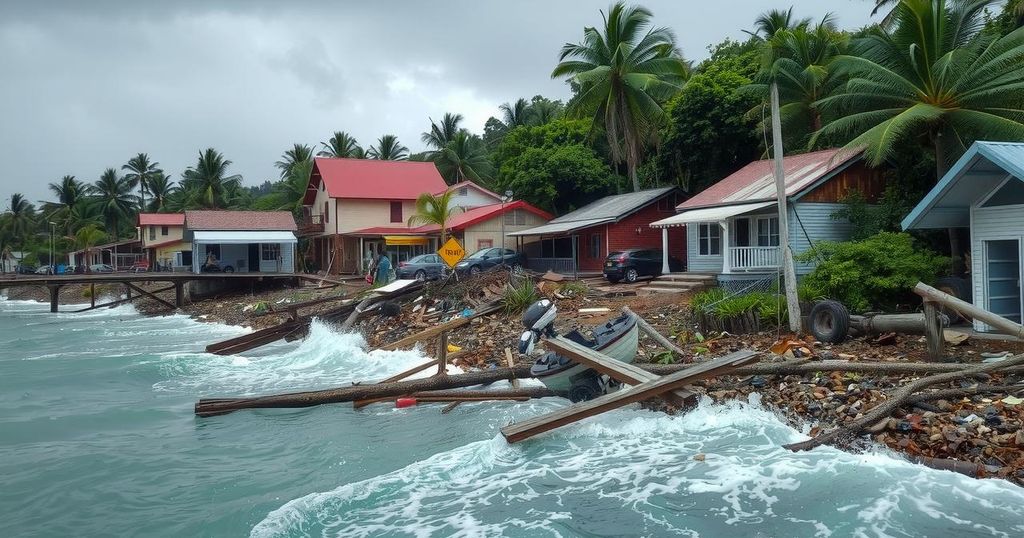Cyclone Chido Devastates Mayotte: A Catastrophe Unfolds

Cyclone Chido has caused catastrophic damage in Mayotte, with residents likening the scene to an atomic bomb’s aftermath. The storm’s intense winds have devastated communities, and local officials predict a rising death toll amid ongoing challenges in relief efforts. This disaster has emphasized the region’s vulnerabilities and the urgent need for improved resilience strategies.
A devastating cyclone, Cyclone Chido, struck the French territory of Mayotte over the weekend, causing unprecedented destruction that residents have likened to an atomic bomb. With wind speeds exceeding 220 kilometers per hour, the category 4 storm has inflicted catastrophic damage across the islands, leaving entire neighborhoods flattened, hospitals and schools destroyed, and communication systems severely disrupted. Local officials anticipate that the death toll could reach hundreds or even thousands, as the situation remains dire for the territory’s 300,000 inhabitants.
The impact of Cyclone Chido, the most powerful storm to hit the region in over 90 years, is overwhelming. Bruno Garcia, the owner of Hotel Caribou, described the chaos, stating, “We lost everything. The entire hotel is completely destroyed.” According to Mayotte Prefect François-Xavier Bieuville, the official death toll of 11 is expected to rise significantly as recovery efforts proceed amid blocked roads and minimal access to critical areas. On the ground, efforts to rescue survivors and provide aid face significant logistical barriers due to severe infrastructure damage.
Mayotte, situated in the Indian Ocean between Africa and Madagascar, is already characterized by significant economic hardships, making an event of this magnitude especially devastating. Emergency responders from mainland France and Reunion Island have been dispatched to assist the stricken territory, although access is complicated by ongoing weather conditions and damaged infrastructure. Meanwhile, the local government faces challenges in establishing reliable communication to conduct an accurate assessment of casualties and facilitate relief efforts.
Compounded by the reality of climate change exacerbating such storms, the cyclone’s extensive fallout highlights the urgent need for broader discussions on disaster preparedness and the environmental vulnerabilities of regions like Mayotte. Cyclones are becoming increasingly destructive, indicating a crucial need for improved infrastructure and resilience strategies in areas prone to natural disasters.
Chad Youyou, a resident of Hamjago, poignantly articulated the devastation by stating, “Mayotte is destroyed … we are destroyed.”
In summary, Cyclone Chido has unleashed devastation on Mayotte, with reports indicating catastrophic damage and a rising casualty count amid ongoing recovery efforts. Emergency services are strained as they navigate blocked access and communication challenges. This disaster underscores the vulnerabilities faced by economically disadvantaged regions like Mayotte and highlights the growing urgency to address the impacts of climate change on such areas.
Mayotte, a French overseas department, lies in the Indian Ocean off the east coast of Africa. The territory, consisting of two main islands, has a population of over 300,000, many of whom live in precarious conditions. This region faces numerous challenges, including poverty, unemployment, and infrastructure deficiencies. Cyclone Chido, a category 4 storm, struck Mayotte, resulting in widespread destruction and chaos, drawing attention to the territory’s vulnerabilities to natural disasters intensified by climate change.
The devastation caused by Cyclone Chido in Mayotte presents a tragic scenario for the local population. As recovery efforts continue amid significant infrastructure damage and an unclear casualty count, the event raises critical questions regarding preparedness and resilience in the face of increasingly severe weather patterns exacerbated by climatic changes. Immediate attention to disaster response and long-term strategies for infrastructure improvement is essential for the recovery and future safety of the residents of Mayotte.
Original Source: www.cnn.com








